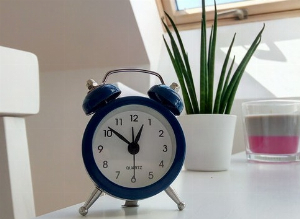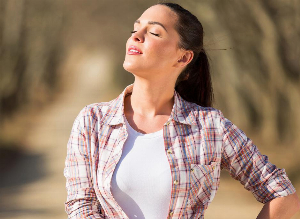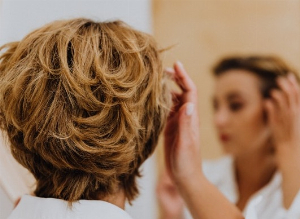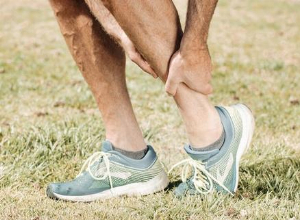How to get a better sleep: tips from a sophrologist
Published 30 Sep 2023 • By Ingrid Fournier
Our relationship with sleep is a complicated one, and we spend a lot of time worrying about it. Because sleeping well is vital!
But the less we manage to fall asleep, the more we worry about not falling asleep and the less sleep we get. And so begins a downward spiral of exhaustion.
So how can we help ourselves to gently drift off to sleep? How can we improve our sleep quality? How can we get longer, more restful sleep?
Ingrid Fournier, a French sophrologist, shares the keys to improving your sleep!
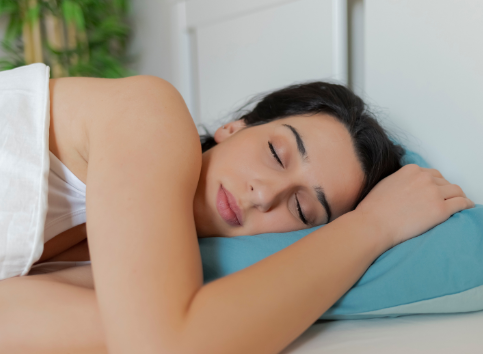
How does sleep work?
Having a better understanding of the internal mechanisms of sleep and how it is organised can help you adopt a more appropriate attitude to your troubles with sleep.
When we sleep we go through several cycles: each night generally comprises between 3 and 5 cycles and the average length of a cycle is 1 hour 30 minutes.
Think of your cycles as trains with several carriages (sleep stages) pulling into a station. The first carriage corresponds to light slow-wave sleep. The body is not very active and the muscles and mind relax, like during a nap. But we are still sensitive to external stimuli (noise, light) that can wake us up. So it's important to be in a calm environment during this first stage.
The next carriage corresponds to deep slow-wave sleep. During this phase, it is very difficult to wake up. It is a restorative sleep, when the body and brain are at rest. This is the time for physical recovery. It is during this phase that children grow, and adults heal and strengthen their immunity.
The last carriage is REM (rapid eye movement) sleep. Brain activity is similar to that observed during wakefulness, but the body is atonic (toneless), hence the term paradoxical sleep. This lack of tone means that we can't mistake our dreams for reality! It is a stage rich in dreams, and even if we don't always remember them, it is important to know that everyone dreams. It is also a time of mental and nervous recovery. It's a very important stage of sleep, because it plays a role in memorisation and the cleansing of brain cells.
These three stages are found in every sleep train.
It is important to remember that the further into the night you go, the less deep sleep there is in each cycle and the more REM sleep there is, which is why we feel as if we've only been dreaming in the morning.
Between each cycle, there is a small period of wakefulness that lasts a few seconds, and most of the time we don't remember it. But this latency may last more than a few minutes, disrupting our sleep and causing us to wake up at night.
Some basic rules to follow to get a good quality sleep
One of the most important rules is to get up and go to bed at regular hours.
Whether you suffer from ephemeral, occasional or chronic insomnia, always get up at the same time during the week. At weekends, you can vary the time you get up by up to an hour.
It is very tempting to sleep in at the weekend to make up for a few bad nights or a sleep debt. But, unfortunately, irregular wake-up times are even more disruptive to sleep.
If you stick to your waking hours, you will be awake for roughly the same amount of time as during the week, so on Sunday evening you'll have enough sleep pressure to fall asleep.
To understand what sleep pressure is, let's take the image of a reservoir. Normally, when we wake up in the morning, our sleep tank is empty. Then, during the day, it fills up until it's full at the end of the day. We then have enough sleep in our reservoir to go to sleep.
You need to be awake long enough to fill up your reservoir, hence the advice to avoid sleeping in late at weekends.
And, as I pointed out earlier, dreams are more prevalent in the last cycles of lighter sleep, which can lead to a feeling of having slept badly. You wake up tired from dreaming too much!
Another essential piece of advice is to go to bed only when the sleep train arrives. There's no point in going to bed if you haven't experienced the first signs, such as: itchy eyes, heavy eyelids, reduced attention (for example, rereading the same page of your novel several times), feeling cold, shivering, yawning or a slackening in the tone of your neck. These signs indicate that you are ready to go to sleep.
So there is no point in going to bed early if you are not sleepy. Remember, it is not you who finds sleep, it is sleep that comes looking for you.
And if you have been in bed for 20 minutes and still haven't fallen asleep: get up! And take up a quiet activity: reading, knitting, ironing, colouring, crossword puzzles, meditation, etc.
The same applies if you wake up in the middle of the night and stay awake for more than 20 minutes. You should go back to bed when you have the sleep signals again.
The action of getting up and not staying awake too long in your bed helps your brain to reinforce this essential association: bed = sleep.
Similarly, if you wake up at the end of the night and stay awake for more than 20 minutes, get up. It may still be early, so take your time. This could be an opportunity to do some stretching, yoga postures or breathing exercises, read a book, take some time for yourself, etc. before starting your day.
The quality of your day and your activities also play an important role in the quality of your night.
Yes, you can start preparing for your night's sleep as soon as you wake up!
In the morning, expose yourself to daylight to give your brain an extra wake-up signal.
In winter, when the sun hasn't yet come out, give the room you are in enough light for breakfast or other morning activities. Why should you do this? Because light is the most powerful synchroniser of our internal clock.
Bright light in the morning brings forward your sleep schedule, and bright light in the evening delays your falling asleep and your waking up the next day.
In autumn and winter, we receive less light, which can lead to sleep problems and seasonal blues. That is why it is important to create opportunities for outdoor activities during these seasons. You can also try light therapy.
Preparing for a good night's sleep by exercising during the day is also essential.
Sedentary lifestyle is often to blame for sleep problems. Sport and physical activity stimulate the sleep-wake rhythm.
Sport can be practised at the end of the day if it is not too intense or if there is no notion of challenge. Indeed, the desire to beat an opponent reactivates the mind.
Don't like sport? Take a walk, climb some stairs, do some gardening, play ball with the kids, walk the dog, get off the bus a couple of stops earlier and walk the rest of the way, cycle some days instead of taking the car or public transport - there are lots of opportunities for you to be active. It's up to you to find what you like best!
At the end of the day, take a moment to relax.
Tips to get a better sleeping environment
- Keep your bedroom quiet. No more than 40 decibels, bearing in mind that a snoring person can emit up to 85 decibels! Don't hesitate to use earplugs if your surroundings are a little noisy. You can also play some soft music for ten minutes or so to help you fall asleep.
- Cooling helps you fall asleep, so don't take a hot bath just before going to bed. If it's very hot, or if you've just come back from sport, you can take a lukewarm shower and wait a minute or so before drying off, perhaps to feel a few shivers. If your hands and feet feel cold, this does not mean that your body is cooling down. Don't hesitate to put on socks and/or mittens to bring down the core temperature in the middle of your body.
- In a recent observational study published in the journal Science of The Total Environment, it was observed that, for the elderly, sleep is more restful when the ambient temperature of the bedroom is between 20 and 25°C. If you're not in this age group, your bedroom temperature should be around 19°C.
- Make sure your bed linen is neat and of good quality, and pay attention to the quality of your pillow. Embellishing your bed with pretty sheets and a duvet cover which is pleasant to the touch will make bedtime more enjoyable.
- Avoid taking stimulants such as coffee, tea, tobacco or alcohol late at night. Alcohol not only reduces the time it takes to fall asleep, but also breaks the structure of sleep patterns. Coffee and tea increase light sleep at the expense of deep sleep, so physical recovery is not complete.
- Eat your evening meal 1 to 3 hours before going to bed. Good to know: slow sugars give you energy for sleep and help you stay asleep!
- Switch off screens 1 hour before going to bed, as light sends signals to your brain. The blue light emitted by screens (computer, tablet, smartphone) gives your brain false information by making it think it's daytime, so it can't go to sleep.
- When you go to bed and different thoughts start coming into your head, get up and write them down on a notepad to get rid of them and free your mind. But do it out of bed. Because thinking is a waking activity!
A breathing exercise from sophrologist Ingrid Fournier
Breathing exercise "4-7-8"
This breathing exercise is very useful for reducing anxiety and stress.
Start by breathing out as much air as possible from your lungs and stomach.
- Place the tip of your tongue on the roof of your mouth just behind your teeth.
- Breathe in through your nose while counting to 4.
- Hold your breath while counting to 7.
- Exhale gently through your mouth, counting to 8.
You can do this exercise 3 times while in bed with the lights off.
Don't hesitate to do it during the day too. The more often you repeat the exercise, the more automatic it will become for your body.
If you're not very comfortable with the 4-7-8 rhythm, you can do it on 3-6-7.
Don't forget that in the event of severe sleep disorders and/or sleep apnoea, it is strongly recommended to see a healthcare professional.
Give it a like and share your thoughts and questions with the community in the comments below!
Take care!
Sources :
Amir Baniassardi, Brad Manor, Wanting Yu, Thomas Travison, Lewis Lipsitz, Nighttime ambient temperature and sleep in community-dwelling older adults, Science of The Total Environment, Volume 899, 2023, 165623, ISSN 0048-9697

 Facebook
Facebook Twitter
Twitter